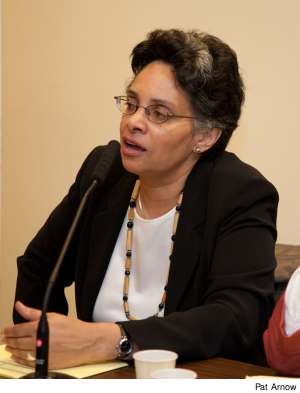On Friday, December 9, 2011, PSC Secretary Arthurine DeSola testified about financial aid for undocumented immigrant students before a joint hearing of the New York State Assembly Joint Hearing of the Committee on Higher Education and Governmental Operations. Here is her testimony:
Testimony of Arthurine DeSola, Secretary
Professional Staff Congress/CUNY
Before the New York State Assembly Joint Hearing of the Committee on Higher Education and Governmental Operations
Concerning legislation to support children of immigrants overcome the financial barriers to college
December 9, 2011
 On behalf of the 25,000 City University of New York (CUNY) faculty and staff represented by the PSC, I wish to begin by thanking you, Higher Education Committee Chair Deborah Glick and Governmental Operations Committee Chair Steve Englebright, for the opportunity to speak on the critical need to improve access to college for immigrant and undocumented students in New York State.
On behalf of the 25,000 City University of New York (CUNY) faculty and staff represented by the PSC, I wish to begin by thanking you, Higher Education Committee Chair Deborah Glick and Governmental Operations Committee Chair Steve Englebright, for the opportunity to speak on the critical need to improve access to college for immigrant and undocumented students in New York State.
At the PSC, we are very proud that New York is among nine states that allow undocumented immigrant students who meet state residency criteria to pay in-state tuition at their public colleges and universities. As you know, undocumented immigrant students can pay in-state tuition rates at CUNY and SUNY if they attend a New York high school for two or more years, graduate, and apply to college within five years of graduation. Undocumented immigrant students also qualify to pay in-state tuition if they receive their GED in our state. New York has been a leader in this regard and the in-state tuition law has made it possible for thousands of undocumented students to obtain a college degree. An estimated 4,500 undocumented students now attend CUNY, and many more would be able to if needs-based financial aid was available to them.
As a counselor at Queensborough Community College for many years and now an elected officer of the PSC, I witnessed first-hand the heroic efforts that immigrant students made to complete college. They are hungry for a college education, and like the majority of CUNY students, they come from families of very modest means. Many of these students must work full time while going to college and frequently must take time off from school to earn enough money to pay for the next semester’s tuition and fees.
Students who are first-generation Americans (the children of immigrants) and immigrant students who themselves have permanent legal status overcome many of these financial hurdles with the help of federal Pell Grants and the state Tuition Assistance Program. Undocumented students, however, are barred from these programs. The one large scholarship program which has been available to undocumented students at CUNY in the past, the Peter Vallone Scholarship program, was discontinued last spring.
The ability to attend CUNY or SUNY and pay in-state tuition and fees is a huge help for undocumented immigrant students. But as you are aware, CUNY tuition has increased by 11.5% since last fall at the four-year colleges. Students at our senior colleges now pay $5,130 annually. For students attending CUNY community colleges, tuition has increased by14.3% to $3,900 over the same period. And tuition is scheduled to increase another $300 per year for the next four years. Low-income, undocumented immigrant students who pay the whole “sticker price” may not be able to afford CUNY at such prices.
The PSC urges the Assembly to consider the bills under discussion today (A.6829 and A.8689) as a package—a package that should be bundled with legislation proposed by the New York Board of Regents to extend TAP assistance to undocumented students. Assembly bill A.8689 and A.8690 (which was introduced after this hearing was scheduled and provides for the use of an ITIN number to establish a 529 college savings account) are worthy of support, if they are part of a comprehensive package of reforms that is specifically targeted to undocumented immigrant students. Taken individually, they do not do enough to broaden access for undocumented immigrant students.
Assembly bill 8689, I note, would provide scholarships from a public-private fund to citizen and legal resident children of immigrants as well as undocumented children. Expanding financial aid to all low-income students is, of course, something the PSC supports, but in this context, it would be better to direct any such aid to undocumented students as citizen and legal resident students already have access to federal Pell and state TAP grants.
Thank you for the opportunity to testify.

